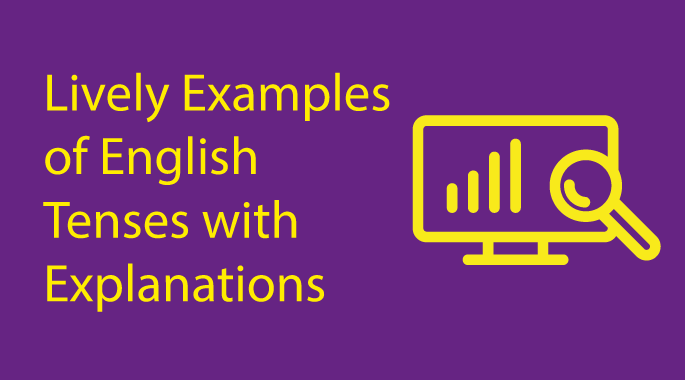Table of Contents

Examples of English Tenses: Introduction
English tenses, the building blocks of effective communication, allow us to express when an action occurred and its state. In this comprehensive guide, we’ll explore the various English tenses through clear definitions and practical examples of English Tenses. Let’s embark on this journey to demystify English tenses, as it’s always helpful to look examples of English tenses when practicing.
What Are English Tenses?
English tenses are like a time machine, enabling us to communicate when an action happens. They come in various forms, each with a unique role. Let’s dive into some examples of English tenses to understand them better.
Present Simple Tense
Definition: The present simple tense is your go-to choice for stating facts, habits, or scheduled actions.
Examples:
- She reads books daily.
- The sun rises in the east.
- They often visit the museum.
Present Continuous Tense
Definition: When you want to talk about actions happening right now or around the present, use the present continuous tense.
Examples:
- I am writing an article.
- They are playing soccer in the park.
- She is cooking dinner for the family.
Present Perfect Tense
Definition: To express actions that happened at an unspecified time before now or have relevance to the present, opt for the present perfect tense.
Examples:
- He has traveled to many countries.
- They have never tasted sushi.
- She has just completed her project.
Past Simple Tense
Definition: The past simple tense lets you narrate completed actions in the past.
Examples:
- She traveled to France last summer.
- He watched a fantastic movie last night.
- We visited the zoo two days ago.
Past Continuous Tense
Definition: Use the past continuous tense for actions that were ongoing in the past or were interrupted.
Examples:
- I was studying when the phone rang.
- They were playing music during the party.
- She was working late yesterday.
Past Perfect Tense
Definition: The past perfect tense helps establish the sequence of events in the past, showing which action occurred first.
Examples:
- By the time I arrived, they had already left.
- She hadn’t finished her book when the movie started.
- They had completed their homework before dinner.
Future Simple Tense
Definition: For actions in the future, the future simple tense is your tool of choice.
Examples:
- I will meet you at the park tomorrow.
- They will visit their grandparents next weekend.
- She will call you later in the day.
Future Continuous Tense
Definition: The future continuous tense highlights actions that will be ongoing at a specific time in the future.
Examples:
- At this time next week, I will be on vacation.
- They will be working on the project all day tomorrow.
- She will be singing at the concert at 8 PM.
Future Perfect Tense
Definition: When you need to express actions that will be completed before a specific point in the future, employ the future perfect tense.
Examples:
- By the end of the year, I will have graduated.
- She will have finished the project by the time you arrive.
- They will have completed the assignment before the deadline.
Examples of English Tenses: Conclusion
English tenses are the palette from which we paint the canvas of language. Understanding when and how to use them is essential for clear communication. By exploring these examples of English Tenses, we hope you’ve gained a deeper understanding of English tenses and how they shape our everyday conversations.
FAQs
Do I need to memorize all English tenses perfectly?
No, you don’t need to memorize them perfectly, but understanding their basic usage is essential for effective communication.
Can I mix different tenses in a sentence?
Yes, in complex sentences, mixing tenses can provide a more comprehensive understanding of time relationships.
How do I choose the right tense for my sentence?
Consider when the action occurred and its relationship to the present and other actions in the sentence.
Are there exceptions to English tenses?
Yes, irregular verbs have unique conjugations in different tenses.
What’s the best way to practice English tenses?
Reading, writing, and speaking in English, while paying attention to how native speakers use tenses, is an excellent way to practice.
Is it okay to mix different tenses in a story or essay?
Yes, strategically mixing tenses can add depth and variety to your writing, but it should be done purposefully to avoid confusion.